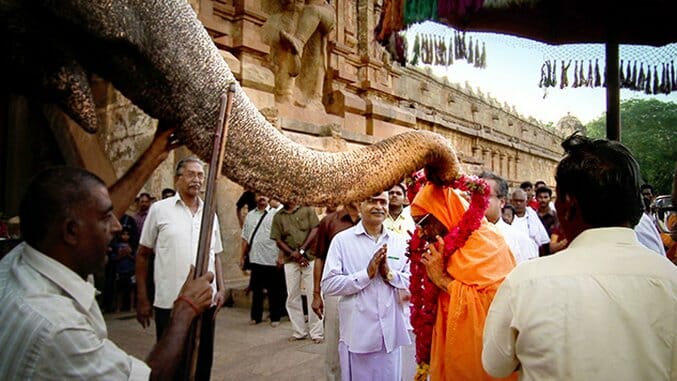
If you pause long enough after saying something slowly, someone is bound to find you profound. That fact is among the unintended lessons imparted by Gurukulam, a well-meaning but hopelessly meandering documentary about Swami Dayananda Saraswati—but also, putatively, fundamental questions about the nature of self-identity, reality and humankind’s place in the world. Co-directed by Jillian Elizabeth and Neil Dalal, however, this deathly dull offering summons forth less questions about spiritual enlightenment and more open-ended ruminations about, exactly, what kind of audience this was even intended for.
The film, in English, Tamil and Sanskrit with English subtitles, unfolds in Tamil Nadu, and its title refers to a type of residential school in India where students live together and, in the guru-shishya tradition, share in meditation and simple communal living while studying and reflecting on the principles of Advaita Vedanta, a Hindu philosophy that emphasizes oneness and ultimate harmony. A brief textual overlay tells viewers that students have traveled to this remote ashram to study Advaita Vedanta for three months, but that some will stay for three years. By the time Gurukulam is over, an audience may feel like they’ve logged a similarly hefty time commitment.
If not animated by agitated advocacy, most mainstream American documentaries (this is actually a US-Canadian co-production) are built around climax, conclusion or at the very least some form of investigatory thrust. Not so with Gurukulam. Still, observational and experiential nonfiction filmmaking can be engrossing (think of Lucien Castaing-Taylor and Ilisa Barbash’s Sweetgrass, for example), when rendered with care and assembled with skill. Gurukulam, though, doesn’t even evoke much of a sense of place, and certainly not a sense of the sacred. There’s a seriousness to the movie, but it’s important to note that it also allows Swami Dayananda’s sense of humor to poke through on occasion, so it’s not a matter of being overwhelmed or turned off by sternness and solemnity. No, Gurukulam instead fails in much more fundamental ways.
Viewers never get a strong enough sense of the sort of individual yearning with which one might identify. One subject, a former American psychology professor, talks at length about the appeal of Advaita Vedanta being rooted in its difference from other faith-based traditions like the Roman Catholicism with which she had grown up, but the movie doesn’t delve substantively enough into this. In fact, much of Gurukulam is dialogue-free, or at least structured and arranged by editor Mary Lampson in such a manner as to invite free association. The intended target is obviously something immersive and impressionistic, but by refusing to attempt to elucidate its central figure’s mission, and only sporadically engaging with his students, the movie succumbs to disjointedness.
This leaves an audience adrift on a sea of extended disquisitions on grammar (argh), and lectures about being “freed from the dualities called pleasure and pain.” Swami Dayananda also says things like, “I am not insignificant. The reality is that I am the reality of everything that is here. So that means that I am the whole, and even when you say that, one ant will be biting or some insect will be biting you.” Earnest and delivered in serene strokes, but also mortally undisciplined, Gurukulam makes one yearn for the fire ant’s bite—at least there’s some emotional clarity in that.
Directors: Jillian Elizabeth and Neil Dalal
Release Date: June 17, 2016